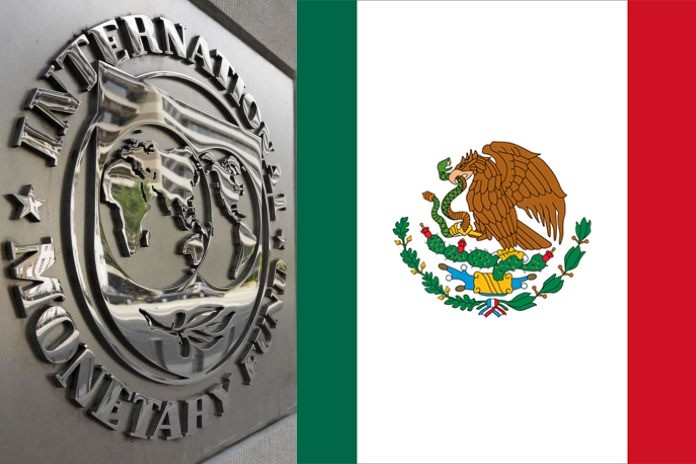USA / MEXICO – The executive board of the International Monetary Fund (IMF) concluded the Article IV consultation with Mexico.
After stagnating unexpectedly in the second half of 2021, the economic recovery picked up pace in the first half of 2022 owing to catch-up momentum, improving labor market conditions, and fiscal policy support. Headline inflation rose from about 3 percent at the end-2020 to 7.4 percent by end-2021 and to 8.7 percent by August this year. Economic activity is expected to slow from 2.1 percent in 2022 to 1.2 percent in 2023, given weaker U.S. and global growth and tighter global financial conditions. Inflation is projected to plateau in the second half of 2022 and then gradually decline.
The government has maintained a broadly neutral fiscal stance in 2022, targeting a fiscal deficit of 3.8 percent of GDP. It has used largely untargeted subsidies to mitigate the rise in the cost of living, offsetting the windfall gains from oil revenues. The gross debt of the public sector (by staff’s definition) is estimated at about 56 percent of GDP. With inflation above target, the central bank has increased the policy rate to 9.25 percent in a series of hikes. Reflecting more resilient domestic demand growth compared to output, the current account posted a deficit of 0.4 percent of GDP in 2021 and is expected to widen to around 1 percent of GDP in 2022-2023. International reserves remain at a comfortable level.
The Mexican banking system remains well-capitalized, and its profitability continues to recover from the impact of the pandemic. Risk analysis as part of the Financial Sector Assessment Program (FSAP), conducted in parallel with the Article IV consultation, found that the systemic vulnerabilities and system-wide liquidity risks in the financial system remain broadly contained, given high capital buffers, low private sector leverage, and no sign of stretched asset prices. However, tail risks bear close monitoring. Financial sector policies have been strengthened in recent years, but further steps are necessary to maintain the resilience of the financial system under the evolving risk environment.
Executive board assessment
Executive directors agreed with the thrust of the staff appraisal. They welcomed the authorities’ prudent macroeconomic policies in the face of a surge in inflation. They noted that economic growth is expected to slow in the near term reflecting weaker US growth and tighter global financial conditions. With increased risks in a more turbulent global environment, Directors agreed that Mexico is well placed to navigate the challenges, owing to its very strong macroeconomic policies and policy frameworks.
Directors welcomed Banco de México’s proactive approach to addressing the inflation surge. With significant uncertainty about the inflation path in 2023 and upside risks, they concurred that further increases in the policy rate and maintaining a restrictive policy stance may be needed for some time. They also generally underscored the importance of clear policy communication. Directors recommended aligning wage increases more closely with expected inflation and the productivity of lower-wage workers.
Directors agreed that the envisaged neutral fiscal stance in 2022 and 2023 is appropriate. They noted that retail fuel price smoothing, while reducing cost pressures, had a sizable cost on the budget, and generally encouraged the authorities to shift toward more targeted support should oil prices rise again in order to protect other priority spending. Contingency plans should be prepared for a swift policy response should downside risks materialize. Increasing fiscal buffers in the short term and reforming the institutional framework for greater flexibility in the longer term would be important. Directors noted that the floating exchange rate should continue to act as a shock absorber, although foreign exchange intervention could be considered if there is a significant worsening of market illiquidity.
Directors agreed that the financial system remains resilient post pandemic, welcomed the favorable assessment of the effectiveness of Mexico’s financial stability framework, and broadly supported the key policy recommendations of the 2022 Financial Sector Assessment Program. They concurred that additional measures, including an update of the financial sector oversight and crisis management frameworks, are needed to keep up with a changing risk and regulatory landscape. After aligning the legal and regulatory AML/CFT framework with Financial Action Task Force standards, the focus should now be to strengthen the effectiveness of the AML/CFT regime, including through adequate resources, ensuring availability of high-quality beneficial ownership information, and monitoring emerging financial risks related to fintech.
Directors urged the authorities to broaden the supply-side policy agenda for higher and more inclusive growth. Efforts should include measures to address corruption and crime and strengthen the rule of law, increase human capital investment, tackle infrastructure bottlenecks, reduce labor and product market rigidities, and promote financial deepening and inclusion. Directors recommended a gradual increase in productive spending, financed by tax reforms, to improve human and physical capital.
Directors generally noted the need to take further steps toward reducing greenhouse emissions. Fostering greater private sector participation in the energy sector would help boost competitiveness and investment.
It is expected that the next Article IV consultation with Mexico will be held on the standard 12-month cycle.






